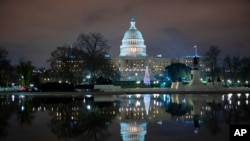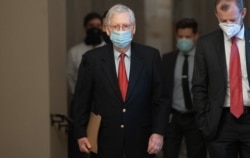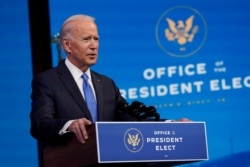The U.S. House of Representatives has passed a massive year-end bill that includes both a $900 billion coronavirus aid package as well as $1.4 trillion in annual government funding, with the legislation now moving to the Senate for approval.
The House passed the bipartisan measure in two parts with a pair of bipartisan votes late Monday with lawmakers having only a few hours to look over the more than 5,000-page bill. The Senate must now approve the measure before a midnight deadline expires to keep the U.S. government funded. Both chambers are also passing a one-week stopgap spending bill to avert a partial government shutdown and give President Donald Trump time to sign the massive legislation.
Senate Majority Leader Mitch McConnell told reporters Monday that passage of the legislation in Senate will probably take place late into the evening, but said lawmakers are “going to stay here until we finish tonight.”
The legislation comes after weeks of negotiations during which Democratic and Republican leaders clashed over how much government assistance to provide for coronavirus relief and whether the focus should be on items such as jobless benefits or keeping open the economy.
It also comes during a surge in COVID-19 infections, with the United States recording more than 18 million confirmed cases as of Monday night — adding more than 200,000 cases per day — and with the country’s death toll standing at more than 319,000 people, according to the Johns Hopkins Coronavirus Resource Center.
One of the main components of the bill is $600 direct payments to most people, with the amount phasing out for those with incomes above $75,000 per year. Treasury Secretary Steven Mnuchin said millions of Americans could begin seeing stimulus payments as soon as next week. A previous round of $1,200 stimulus payments was included in a much larger coronavirus relief bill in March.
The new bill also includes $284 billion for the Paycheck Protection Program, an initiative meant to help businesses keep workers employed during a period in which the economic pressure of the pandemic may have forced added layoffs.
There is also $300 per week in unemployment benefits for 11 weeks, as well as $82 billion for local schools and universities, $25 billion in rental assistance, $15 billion for theaters and $10 billion for child care. There is also $4 billion to help other countries with vaccination efforts for COVID-19, the disease caused by the coronavirus.
“There will be another major rescue package for the American people,” McConnell said in a statement Sunday. “As our citizens continue battling the coronavirus this holiday season, they will not be fighting alone.”
House Speaker Nancy Pelosi and Senate Minority Leader Chuck Schumer said the relief bill is just a first step.
“It is not the end of the story, it is not the end of the job," Schumer told reporters. “Anyone who thinks this bill is enough does not know what’s going on in America.”
President-elect Joe Biden praised the bipartisan spirit that produced the measure, which he called “just the beginning."
Work on the bill was stalled by disagreements between Democrats and Republicans about key issues for both sides. The measure announced Sunday did not include the legal liability protections for businesses that Republicans sought, nor did it have extra aid for state and local governments that Democrats wanted.
The coronavirus aid bill is part of a wider $1.4 trillion spending package that would fund the U.S. government through September.
It includes an extension of tax breaks for numerous businesses for at least the next year, $45 billion for transportation needs including Amtrak, and $13 billion for a major expansion in food stamps.
The Associated Press reported before the bill’s final passage that the legislation would likely provide a last $1.4 billion installment for Trump’s U.S.-Mexico border wall as a condition of winning his signature.
Officials at the White House have said Trump will sign the legislation.
Lawmakers passed a series of stopgap funding bills in recent days to avoid a government shutdown as they negotiated the final details. The House and Senate both passed on Sunday, and Trump signed, the latest extension, lasting through Monday.







